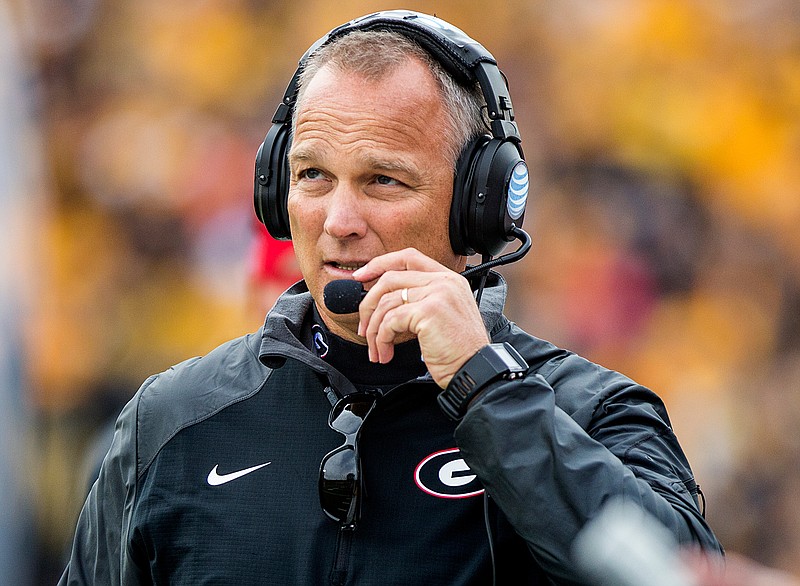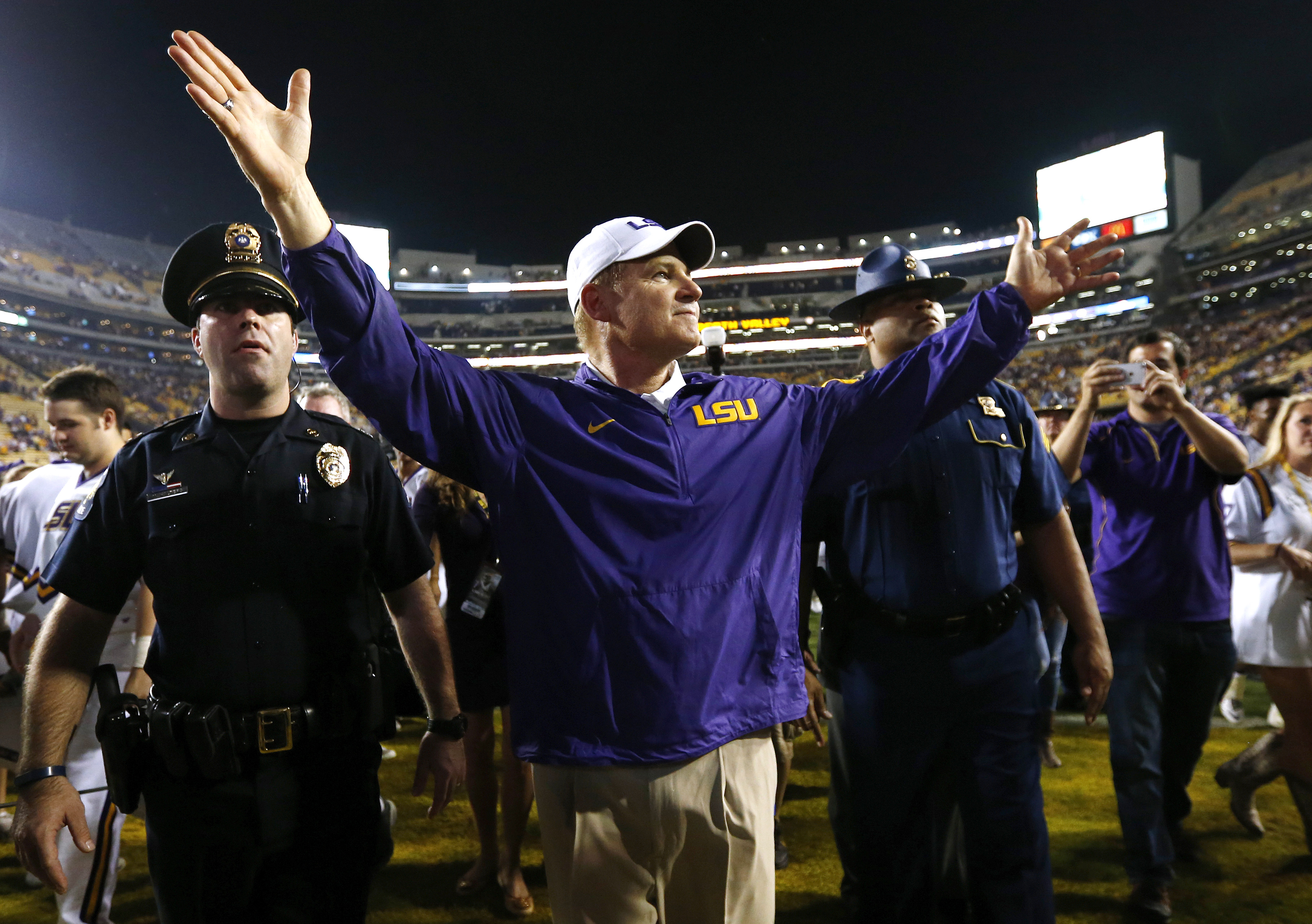Also read
* Richt meets with Miami as bowl fate awaits the Bulldogs* Georgia closing in on Kirby Smart as new football coach* Exiting Georgia coach Mark Richt keeping career plans wide open * Vols' Jones says high coaching turnover 'unfortunate' * Wiedmer: Is Georgia headed down same path as post-Fulmer UT? * Four people who could be the next Georgia Bulldogs football coach * Memorable moments from Richt's UGA career * Richt fired as Georgia football coach
Were you dumbfounded this weekend when you heard Mark Richt was fired as the football coach at the University of Georgia?
Did the news that Louisiana State University officials made a decision to keep Les Miles - and skip paying him $15 million to buy out his contract - during the third quarter of a meaningless game Saturday night seem shocking?
Well, it shouldn't.
Yes, the fact that Richt and Miles - two football coaches who have set program records for winning percentages - were on the hot seat is staggering to those of us in the real world who try to the best we can at real-world jobs.
But major college football is not the real world. It's a tiger-filled jungle wall-papered with Monopoly money and filled with the understanding that being good is the baseline and being anything other than Nick Saban is unacceptable.
There are more than a dozen college football jobs open as you read this. Those opportunities pay in the millions of dollars, and represent more than 10 percent of the entirety of the major college football coaching profession.
Ten percent. It's one of the reasons why this coaching carousel is called the silly season of college football.
Silly? For sure. In fact, silly is not a strong enough word.
The Washington Post reported last week that the 48 largest college athletics programs in the country brought in $4.5 billion last year, yet more than half of those programs still lose money.
Yes, the revenue generated has more than doubled across the board in the last decade, according to the Post's report, and a vast majority of these athletic departments lose money.
Now, know this: College administrators and athletic directors are consistent in their worries and concerns about the fiscal ability to pay athletes moving forward.
I have been, too.
I've always contended that paying players could bankrupt this entire system, and in truth, a scholarship worth hundreds of thousands of dollars is being undervalued in its scope.
But if LSU is able to pay Miles and his staff more than $15 million not to coach at a record-setting level, then how can we cry foul for the players wanting more?
In truth, the opulence of college football's power programs is akin to the pharaohs of ancient Egypt. And that's the polite way to put it.
At worst, the fact that college sports programs are crying poverty at a time when they are generating a record amount of revenue screams either book cooking at a Bernie Madoff scale or a level of mismanagement that is borderline criminal.
It's a flawed system for athletic directors in particular and college presidents, too, considering the university's highest-paid and highest-profile employee is the football coach.
Yes, for a guy like Nick Saban, who makes more than $7 million a year and in a lot of ways is underpaid considering donations have more than tripled, enrollment is up and applications have more than doubled in the eight years he has led Alabama to the top of the college football world, that is A-OK for everyone involved.
Heck, Gus Malzahn led Auburn to last in the SEC West and made more than $4 million to do it. Seven years ago, eight wins put Phillip Fulmer's job in jeopardy; today, eight wins is going to get Butch Jones a raise.
That's the arms race in the strong-arming that has become SEC football.
For guys like Richt and Miles - coaches who have enjoyed great success, but pale in comparison to Saban - those riches are there, and the demands are greater than greatness. Richt and Saban also share the surprisingly damning trait that is experience.
After more than a decade on the job, the daily gratification of "very good" fades as the quest for "great" becomes all-encompassing.
With those lofty standards, good simply is no longer enough, and while being the best at your job in the history of a school may be admirable, eventually it's not as attractive as the buzz and the promise of potential greatness.
It's crazy but a new chapter can be more attractive to administrators than the same classic. So looking for the next big thing - like Malzahn was when he led Auburn to the BCS title game in his first year or like Florida did by winning the SEC East this season in Jim McElwain's first year - becomes tempting.
It's not a safe road, for sure, but one unlikely to change.
It's not going to change when athletic administrators, who pay themselves more than ever to make puzzling decisions at the whims of well-heeled and high-powered boosters, live in a vacuum where in part they have to justify their existence.
Heck, Tennessee Athletic Director Dave Hart makes $150,000 extra per year in "media appearances" fees. (And having heard Hart speak, that's about three zeros too many.)
The NCAA and in turn athletic directors have bemoaned the difficulties of reform, rising costs or Title IX for an inability to manage these ever-growing monoliths.
Those are the cries when the issues of paying players or doing away with a sport are mentioned. Those cries, however, should forever ring hollow if LSU was prepared to pay its football staff $15 million to walk away. Those cries should become screams for better leadership within the athletic departments when Georgia sends Mark Richt into the sunset with little more than the "It's us, not you," break-up rationale.
In fact, Georgia Athletic Director Greg McGarrity should be firmly in the crosshairs of every Bulldogs fan everywhere for this decision.
And the fact that McGarrity will pay six figures from the budgets of a state-funded institution to a search firm to replace a record-setting coach screams volumes about college sports in general.
It is an unbridled attempt to spend your way to success, and they are doing it with tax-free revenue and a reckless regard for regulation, oversight or discretion.
They call this the start of the silly season. Here's another word: crazy.
Contact Jay Greeson at jgreeson@timesfreepress.com and 423-757-6343. His "Right to the Point" column appears on A2 on Tuesdays, Thursdays and Saturdays.



